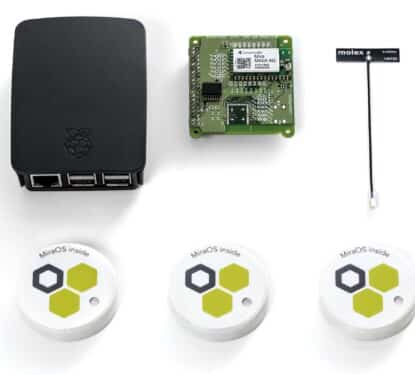Last week Samsung Electronics announced a new contract with SK Telecom to deploy a Internet of Things (IoT) dedicated nationwide LoRaWAN network.
The network will be deployed across Korea using the 900 MHz frequency band. The commercial service is scheduled to launch in Daegu, Korea’s fourth largest city, next month and will be available nationwide by the middle of this year.

Samsung is hailing the new LoRaWAN-based network as the world’s first for commercial use, although KPN in The Netherlands says it will also have a nationwide network available by June, and Swisscom is deploying its national network this year as well. What is clear it that we are moving beyond community-based networks to the establishment of full commercial IoT deployments around the world.
LoRaWAN (Long Range Wide-Area Network) is a low-power, long-range, and low-bandwidth networking solution that’s ideal for communications between the sensors that will blanket smart cities. It’s meant to augment, not replace networking solutions that connect bandwidth and power-hungry mobile devices like laptops and smartphones.
According to the announcement Daegu will serve as a test bed for the IoT network, and focus on setting up and adopting infrastructure for renewable energy solutions, cloud platforms and big data analytics of healthcare and medical services, as well as electric vehicle infrastructure for autonomous cars. Streetlights, for example, will collect weather and traffic information using IoT sensors, enabling cost savings by automatically adjusting the lighting level and also sending air pollution status information.
“Now is a critical moment for ICT companies looking for new future business opportunities such as IoT services”, said Youngky Kim, President and Head of Networks Business at Samsung Electronics. “We are very pleased to partner with SK Telecom for its pioneering IoT vision. Samsung will contribute in creating the ecosystem for enabling significant changes driven by new IoT services”.
South Korea has long been a trailblazer in telecom deployments. It deployed WiMax, for example, long before it was available elsewhere and it was also an early adopter of DMB television. The Asia-Pacific nation also announced its intention to invest 100 billion Won in 2024 to research and promote the use of smart cars. South Korea has also already put up some money for the construction of Songdo, which is considered by many as the world’s first smart city.
“With the early deployment of a nationwide IoT network, SK Telecom will be able to maintain its position as pioneer in the field of telecommunications”, said Lee Jong-bong, Executive Vice President and Head of Infra Division at SK Telecom. “SK Telecom will continue to work closely with partners including Samsung to deliver new value and convenience to both individual and enterprise customers over the IoT network”.
SK Telecom is committing fully to the IoT with a pledge to invest over $84 million on IoT projects and even module manufacturing over the next few years. The telecom company is also a long-standing LoRa Alliance member so has been committed to the LoRa technology for some time. Even so, it’s notable that it’s pushing ahead with what appears to be extensive LoRa deployments despite the fact that ‘standards’ are now being worked on by 3GPP to develop IoT network technologies to work in licensed spectrum, however these are thought unlikely to be ready for deployment for a few years yet.
LoRaWAN IoT networks use an unlicensed, public spectrum called the Industrial Scientific and Medical (ISM) frequency band. To prevent degradation of other industrial communications already using the ISM band, the network will support the Listen Before Talk (LBT) function. As well as a new service model, the Internet of Small Things (IoST), that will also be introduced as a key facilitator for more business opportunities utilising Low Power Wide Area.
In fact, South Korea’s largest telecom, KT (formerly Korea Telecom), will be investing $128.7 million in establishing an NB-IoT network using LTE-M to support the network in Korea. It will also offer about 100,000 IoST sensor modules for developers to spur the IoST business ecosystem.“We will provide 100,000 IoST telecom modules for free and offer the service without charge this year. We will pour 150 billion won into this sector, which is an aggressive investment”, KT’s IoT business division senior vice president Kim June-keun said
IoST can also be applicable to every industrial sector, from manufacturing to agriculture, he said. Sensors attached to manufacturing lines will enable factory automation and boost industrial safety. “We will provide modules almost limitlessly to developers to fulfil diverse business needs that we cannot yet imagine”, he said.
Be it for smart city networks or otherwise, South Korea is setting standards for IoT deployment worldwide. The new LoRaWAN network should further develop the country as a centre for smart cities innovation by providing a cheap way to connect physical urban infrastructure to the internet.



